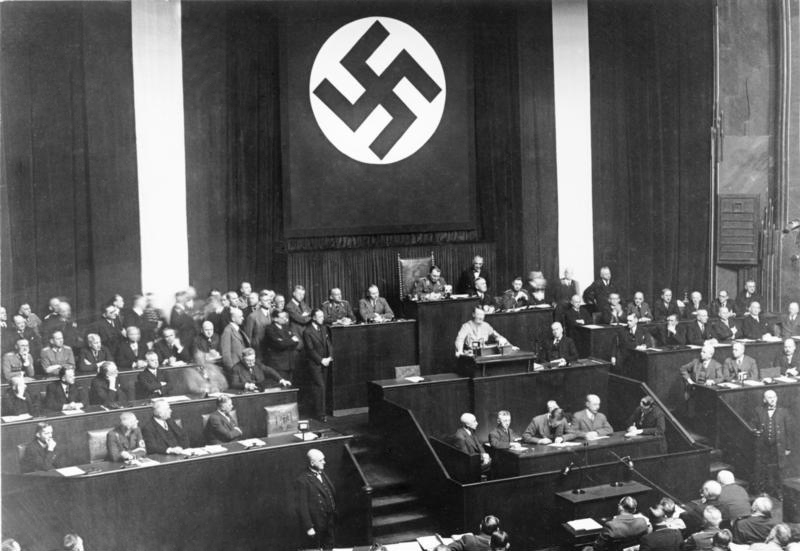



Following the Reichstag fire, the Nazis began to suspend civil liberties and eliminate political opposition. The Communists were excluded from the Reichstag. At the March 1933 elections, again no single party secured a majority. Hitler required the vote of the Centre Party and Conservatives in the Reichstag to obtain the powers he desired. He called on Reichstag members to vote for the Enabling Act on 24 March 1933. Hitler was granted plenary powers "temporarily" by the passage of the Act. The law gave him the freedom to act without parliamentary consent and even without constitutional limitations.
Employing his characteristic mix of negotiation and intimidation, Hitler offered the possibility of friendly co-operation, promising not to threaten the Reichstag, the President, the States or the Churches if granted the emergency powers. With Nazi paramilitary encircling the building, he said: "It is for you, gentlemen of the Reichstag to decide between war and peace". The Centre Party, having obtained promises of non-interference in religion, joined with conservatives in voting for the Act (only the Social Democrats voted against).
The Act allowed Hitler and his Cabinet to rule by emergency decree for four years, though Hindenburg remained President. Hitler immediately set about abolishing the powers of the states and the existence of non-Nazi political parties and organisations. Non-Nazi parties were formally outlawed on 14 July 1933, and the Reichstag abdicated its democratic responsibilities. Hindenburg remained commander-in-chief of the military and retained the power to negotiate foreign treaties.
The Act did not infringe upon the powers of the President, and Hitler would not fully achieve full dictatorial power until after the death of Hindenburg in August 1934. Journalists and diplomats wondered whether Hitler could appoint himself President, who might succeed him as Chancellor, and what the army would do. Hitler combined the two positions, so that all governmental power lay in his hands. All soldiers took the Hitler Oath on the day of Hindenburg's death, swearing "unconditional obedience" to Hitler.

Adolf Hitler addressing the Reichstag on 23 March 1933. Seeking assent to the Enabling Act, Hitler o...
